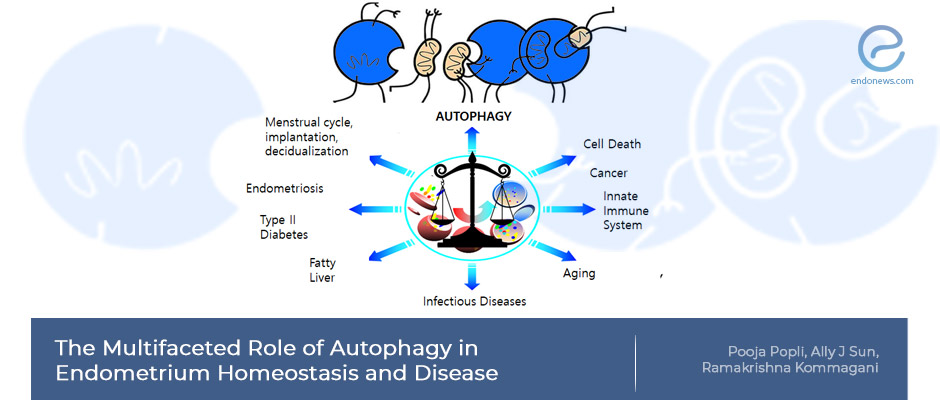Autophagy, Endometrium and Endometriosis
May 4, 2021
The Intricate Role of Autophagy
Key Points
Highlight:
- Autophagy acts as a double-edged sword in endometrium-related pathologies.
- Uterine-specific genetic modulation studies on key autophagy genes may provide detailed mechanistic insights in the future.
Background:
- Autophagy degrades cytosolic material via sequestration into double-membrane vesicles called autophagosomes that subsequently fuse with lysosomes.
- Autophagy has been extensively studied for its role in endometrial pathophysiology, with the expectation to provide a better understanding of its physiology and offer clues on the treatment of endometrium-related diseases or infertility.
Key points:
- Decreased autophagy, along with increased mTOR activity, has been reported in postmenopausal ovarian endometriosis.
- Dienogest-mediated mTOR inhibition induces autophagy leading to apoptosis of endometriotic cells.
- These findings suggest a possibility for new therapeutic agents targeting the mTOR pathway or other autophagy-related molecular pathways to induce autophagy and treat endometriosis.
- The role of autophagy in endometrial cancer is controversial because it is both pro-survival and pro-apoptotic.
- Conventional antitumor therapies may activate autophagy in tumors as a pro-survival response, thus contributing to treatment resistance; however, progressive autophagy can be cytotoxic and can result in apoptosis of tumor cells.
Conclusions:
- Autophagy acts as a double-edged sword in endometrium-related pathologies with a very limiting knowledge regarding the mechanisms underlying its multifaceted role.
- Future studies using uterine-specific conditional knockout mice for important autophagy genes may provide detailed mechanistic insights into the role of autophagy in the endometrium.
Lay Summary
Autophagy, or autophagocytosis, is a self-digestion process by which cells recycle non-functional proteins to repurpose them. Unwanted cellular parts in cytosolic material are first isolated within double-membrane vesicles called the autophagosome, which subsequently fuses with the acidic lysosome. Autophagy is a survival mechanism, conserved across species, and is essential for maintaining endometrial homeostasis and mediating endometrial-specific functions, including menstrual cycle, embryo implantation, and decidualization.
Studying the role of autophagy in the endometrium will provide a better understanding of its pathophysiology and offer clues on how to treat endometrium-related diseases or infertility.
Dr. Kommagani group from Washington University School of Medicine, St. Louis, MO, USA, summarized the most recent knowledge of autophagy in endometrium pathology. This paper was recently published in the journal “Reproductive Sciences”.
Recent findings have highlighted a potential connection between autophagy and the pathogenesis of endometriosis. Decreased autophagy, along with increased mTOR activity, has been reported in postmenopausal ovarian endometriosis. Also, dienogest-mediated mTOR inhibition induces autophagy leading to apoptosis of endometriotic cells. These findings suggest a possibility for new therapeutic agents targeting the mTOR pathway or other autophagy-related molecular pathways to induce autophagy to treat endometriosis.
The role of autophagy in endometrial cancer is controversial because it is both pro-survival and pro-apoptotic. Conventional antitumor therapies may activate autophagy in tumors as a pro-survival response, thus contributing to treatment resistance. However, progressive autophagy can be cytotoxic and can result in apoptosis of tumor cells.
In recent years, several efforts have been made to determine the therapeutic benefits of autophagy modulation for endometrium-related diseases. Autophagy acts as a double-edged sword in endometrium-related pathologies, however, there is still limited knowledge regarding the mechanisms underlying its multifaceted role.
Future studies using uterine-specific conditional knockout mice for important autophagy genes may provide detailed mechanistic insights into the role of autophagy in the endometrium.
Research Source: https://pubmed.ncbi.nlm.nih.gov/33877643/
Autophagy Endometrium Endometriosis Endometrial Cancer

